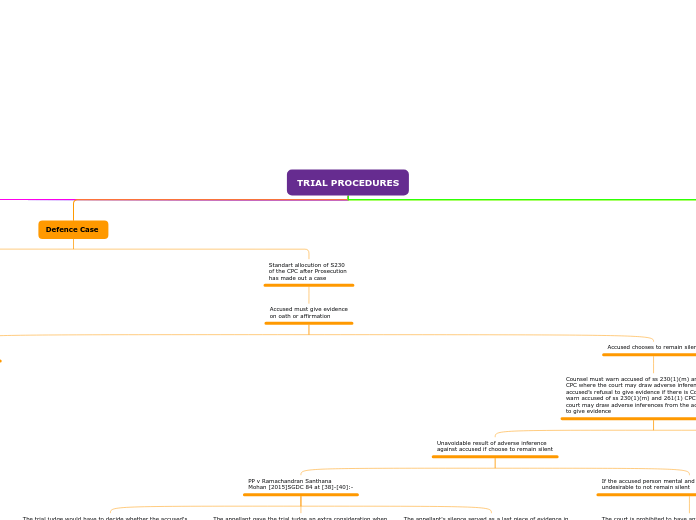TRIAL PROCEDURES
Commencement of Prosecution Case
Prove all elements of charge
Eg:Dishonest intention etc
Decide who is going to help to prove
Witnesses
Relay story to judge
to understand case
Statements
Examination of Prosecution Witnesses
Prosecution can summon any
witness deem fit
Cross Examination by
defence questioning Prosecution
witnesses
Witnesses are examined according
to S137 to S168 of evidence act
Re-Examination by
Prosecution for the purpose
of clarifying certain issues
Close Prosecution Case
& No Case to answer submission
The prosecution will inform the court
that it is closing its case
Defence can make a submission that
the evidence does not disclose a case to answer
No Case to Answer
Threshold of No Case to answer
Some evidencec
Evidence not inherently incredible
Accept evidence as accurate
Evidence establishes each essential element
of the offence
If Prima Facie is not
Satisfied
The court must order a discharge
amounting to an acquittal
Acquittal of accused
Prima Facie case-at first sight
Must be proved
the court is of the view that there is some evidence
which is not inherently incredible and which satisfies
each and every element of the charge as framed by
the prosecutor or as altered or framed by the court,
the court must call on the accused to give his defence.
that the evidence on the primary facts is true
unless the evidence is inherently incredible
The test does not apply to determine if all of the
evidence examined will definitely and inevitably
lead to a single conclusion.
Essentially, at the conclusion of the prosecution's case,
the judge should ask himself, not, "Has the prosecution's evidence already done so," but rather, "If I were to accept
the Prosecution's evidence as accurate, would it establish
the case against the accused beyond a reasonable doubt?"
The credibility of the witnesses and the quality of the evidence are not issues for the court at this point. If the credibility is only questioned, questions still need to be answered. Evidence should only be disregarded if it is irrational, or if a reasonable person could find it to be true.
Until all evidence on behalf of the prosecution and defence has been heard, the judge should be open-minded about the truthfulness and accuracy of the recollections of the witnesses.
There's no reason to wonder if the witness's evidence is questionable. Acceptance of the evidence is required unless it is manifestly implausible.
Defence Case
The burden of proof is on the prosecution
Prosecution must prove it's case
There is no obligation for defence to proof evidence
Subtopic
Standart allocution of S230
of the CPC after Prosecution
has made out a case
Accused must give evidence
on oath or affirmation
Accused agrees to give
evidence
Accused chooses to remain silent
Counsel must warn accused of ss 230(1)(m) and 261(1)
CPC where the court may draw adverse inferences from the accused’s refusal to give evidence if there is Counsel must warn accused of ss 230(1)(m) and 261(1) CPC where the court may draw adverse inferences from the accused’s refusal to give evidence
Unavoidable result of adverse inference
against accused if choose to remain silent
PP v Ramachandran Santhana
Mohan [2015]SGDC 84 at [38]-[40]:-
The trial judge would have to decide whether the accused's guilt could be proven beyond a reasonable doubt based on the prosecution's witnesses' whole case as well as any appropriate conclusions that could be made from his silence.
The appellant gave the trial judge an extra consideration when determining whether the appellant's guilt had been proven beyond a reasonable doubt by failing to refute the evidence, which as it stood would have supported his conviction if left unchallenged.
The appellant's silence served as a last piece of evidence in the chain of evidence, proving the appellant's guilt beyond a reasonable doubt when taken into account in conjunction with other pieces of evidence.
If the accused person mental and physical condition makes it undesirable to not remain silent
The court is prohibited to have any adverse inference against accused- S261 of the CPC
Subtopic
Prosecution Rebuttal Witness
The prosecution may call a witness or recall
and re-examine a witness for the purpose of rebutting
any aspect of the defence case
Court will only allow this
if prosecution was misled or
taken by surprise
Recalling of witnesses in ancillary hearing - s 279(6) CPC: Court may allow any witnesses (in an ancillary hearing) to be recalled in the interest of justice.
Recall of witness following charge revision - s. 131 CPC: Unless the court determines that the application is frivolous, vexatious, or intended to impede or delay justice, the prosecution and accused may call back and re-examine any witness.
Closing Submissions
Defence to first make closing submissions
followed by prosecution.
Both parties will be allowed to exchange their submissions and allowed to reply to the other’s submissions.
Judgment
Acquit
Judgement should be delivered
in open court in the presence
of both parties
Accused must be present in an
exception of S154 of the CPC
an offence punishable by fine only or by imprisonment for 12 months or less, or both
appear by an advocate
a etter plead guilty and agree to pay
any fine that may be imposed for that offence
Convict
Defence will mitigate
sentence before sentence is passed
All imprisonment sentences must be pronounced in the accused’s presence
Fine
Caning
Death Penalty
Community orders
Imprisonment
PP may decline to further prosecute at any
stage of the trial
A discharge under s 232(1) shall not amount
to an acquittal unless the court so directs
Goh Cheng Chuan v PP [1990] 1 SLR(R) 660 (HC)
